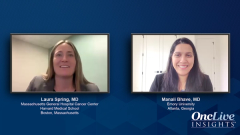
Exciting Data in the Treatment of HER2-low from SABCS 2023
Laura Spring, MD, and Manali Bhave, MD, highlight promising new systemic treatment options on the horizon for patients with metastatic breast cancer, including T-DM1 for HER2-low disease, the AKT inhibitor capivasertib, and novel endocrine therapies.
Episodes in this series

As they wrap up the discussion, Bhave asks Spring about any novel therapeutics or exciting data from the San Antonio Breast Cancer Symposium in 2023.
Spring highlights the ongoing DESTINY-Breast12 trial evaluating trastuzumab deruxtecan monotherapy in patients with metastatic HER2-low (IHC 1+/2+) or HER2 IHC 0 (ultra-low) breast cancer. This study builds upon the phase 2 DAISY trial showing meaningful activity with T-DXd even in IHC 0 patients, underscoring the complexity of HER2 assessment and the potential for benefit across the spectrum of low HER2 expression.
Bhave notes updates in the endocrine-sensitive space as well, including the recent approval of the first AKT inhibitor, capivasertib, based on a study showing a 4-month progression-free survival benefit when combined with fulvestrant (7 months total). However, the approval is limited to patients with alterations in AKT or the PI3K pathway based on subgroup analyses. She emphasizes the importance of patient education regarding the unique dosing schedule (4 days on/3 days off) and potential side effects like diarrhea.
Both express excitement about the progress with novel endocrine agents as monotherapy and in combinations, such as PROTACs, SARMs, and SERDs like lasofoxifene, as well as ongoing trials combining newer oral SERDs with everolimus or AKT inhibitors.
In closing, they reflect on the rapid advancements and expanding treatment options in breast cancer over recent years. Spring thanks Bhave for the insightful discussion and the audience for their attention, hoping the program proves valuable in managing breast cancer patients.
This summary was AI-generated and edited for clarity.






































